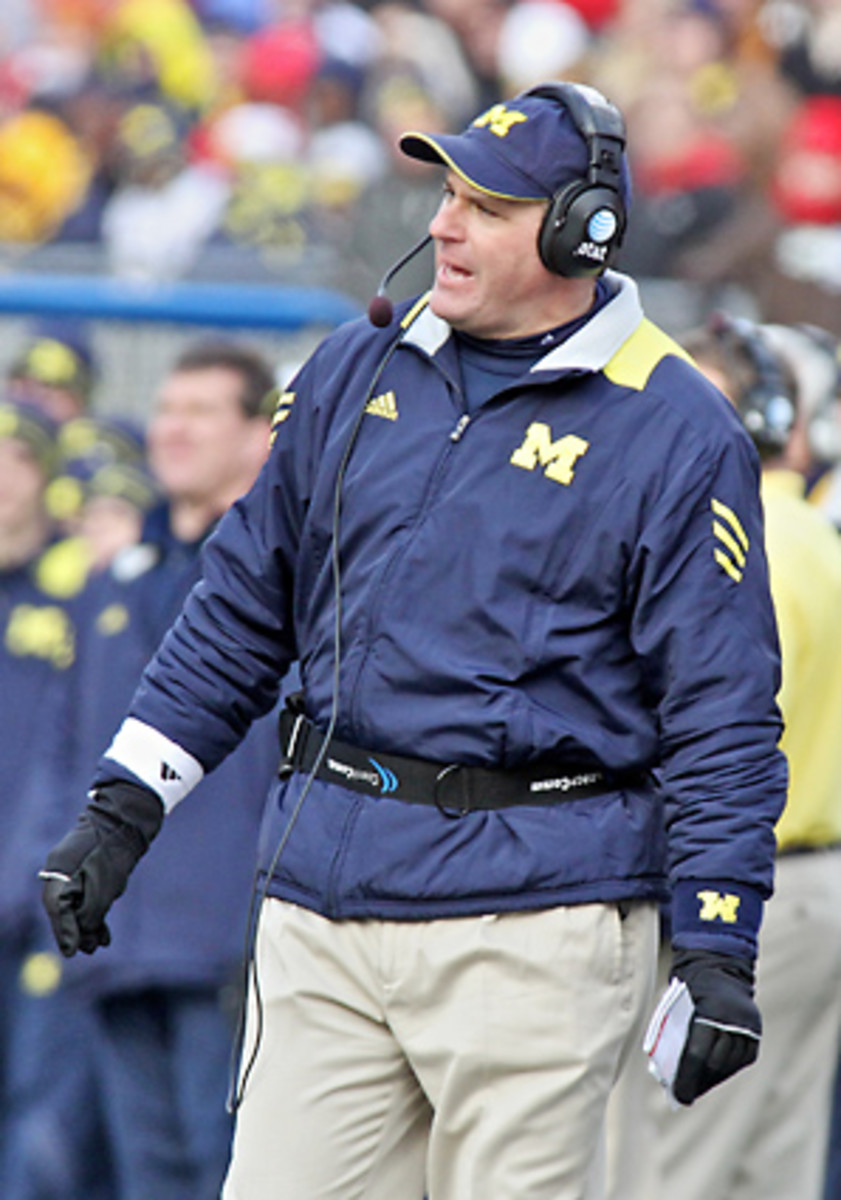Rodriguez has better chance of success at Arizona than Michigan
Move over, Desert Swarm. Here comes the Desert Shred.
As Arizona AD Greg Byrne revealed via IPhone camera Monday, Rich Rodriguez is the new coach of the Arizona Wildcats. There are many reasons to believe the oft-maligned former Michigan coach will achieve better success at long-suffering Arizona, but chief among them is this: Arizona is not Michigan.
Arizona doesn't have a long list of stuffy traditions it expect its coach to memorize before he arrives. There are no ghosts of coaching legend past by which his every move will be compared. There will be no collective freak-out if he dares utters the word "ain't" at a press conference, and considering it just withstood eight years of Mike Stoops sideline tantrums, there shouldn't be much outrage over animated coaches using salty language at practices. There may be reporters monitoring his teams' practice hours, but after last year's NCAA wrist-slap, here's guessing he does the same.
Some coaches just don't fit well at certain schools. Rodriguez was doomed from nearly Day 1 at Michigan. Read the recent book Three and Out for more on the many reasons why. Brady Hoke, by contrast, practically bleeds Maize and Blue. He's already proven the better choice to lead the Wolverines.
At Arizona, however, where the fans will warmly welcome anyone with a hint of ability to deliver the Wildcats' first-ever Rose Bowl berth, Rodriguez will be free to do what he did so well back at West Virginia: Coach football. We know he's capable because he led the Mountaineers to a pair of BCS bowls, and once there, they knocked off champions from the SEC (Georgia) and Big 12 (Oklahoma). He came within an 11th-hour heartbreaker of playing for a national championship. He showed just how potent a spread offense can be with a dynamic athlete like Pat White or Denard Robinson -- guys that would have been moved to receiver 10 years ago -- taking shotgun snaps.
Oregon coach Chip Kelly has spent the past few years dominating the Pac-12 with much the same offense. If you're Arizona, currently in the final stages of nightmarish 3-8 season, why not try it yourself?
Even more so than at Michigan, Rodriguez walks into a program where the cupboard is fairly bare -- with one notable exception. In Ann Arbor, it took three years to develop a reliable quarterback (Robinson) to run his offense. In Tucson, he'll inherit senior-to-be Matt Scott, a dual-threat guy who shined in relief of injured starter Nick Foles in 2010 before redshirting this season. He should have little trouble adapting to Rodriguez's offense and filling the void until he can recruit someone of his own.
But if the Michigan experiment taught Rodriguez anything, his first order of business should be defense -- specifically, hiring the right defensive coordinator. Besides mass player attrition and a former coach undermining him at every turn, Rodriguez's biggest cause for downfall at Michigan was an atrocious defense, caused in part by a coaching disconnect. Rodriguez first hired a coordinator, Scott Shafer (now at Syracuse), of whom he had little prior knowledge. That lasted one season. He then brought in the more high profile Greg Robinson, but insisted the longtime 4-3 coordinator run his preferred 3-3-5 scheme from West Virginia. They never meshed.
Rodriguez ran into this problem to begin with because upon his hiring, he wasn't able to convince the architect of that defense, Jeff Casteel, to join him in Ann Arbor -- reportedly for financial reasons. It will be interesting to see if Rodriguez makes another run at Casteel, who's still in Morgantown but now working for a coach, Dana Holgorsen, with whom he had no prior experience. If not, he'll need someone with experience and success at a BCS-conference school, in whom he can trust enough to focus on his own area of expertise: Offense.
Recruiting will obviously be the other immediate priority. In theory, he should have access to a plethora of the athletes he needs what with the close proximity to both Southern California and Texas. Of course, every coach before him has had the same advantage, with limited results. (Dick Tomey produced the only two double-digit win seasons in school history, in 1993 and '98.) Rodriguez has thrived in the past by developing under-the-radar recruits, often deemed too small or unconventional for their positions. Both White and Denard Robinson were lightly recruited as quarterbacks, as was former Mountaineers running back Steve Slaton. He'll need to do more the same to keep pace with USC or Oregon.
The other potential stumbling block: Rodriguez has never coached anywhere but the Eastern time zone. When West Virginia played in Arizona for that Fiesta Bowl, he was already gone to Michigan. It's not known whether he's ever seen a cactus, much less held football practice in 110-degree "dry heat."
It will be imperative, then, that his new coaching staff contains a mix both of assistants he knows and trusts but also ones with Pac-12 experience. He'll need recruiters that know California high schools inside out. Oregon's Kelly is from New Hampshire. It's not a deal-breaker. But he also retained several members of predecessor Mike Bellotti's staff. Rodriguez might think to follow suit.
One thing working in his favor: He's walking into a division, the Pac-12 South, that may be about to produce a 7-5 championship game participant. Arizona is only a year removed from a 7-1 start and victory over ranked Iowa; only two years removed from posting a second-place Pac-10 finish. Talented USC will be the class of the division, and possibly the conference, next season, but there's no reason the Wildcats can't compete immediately with Arizona State, UCLA, Utah and Colorado. And NCAA scholarship reductions may eventually fell the Trojans.
The Pac-12 is already full of entertaining offenses. It's about to get another. With a little extra emphasis on the other side of the ball, Rodriguez should do just fine.






